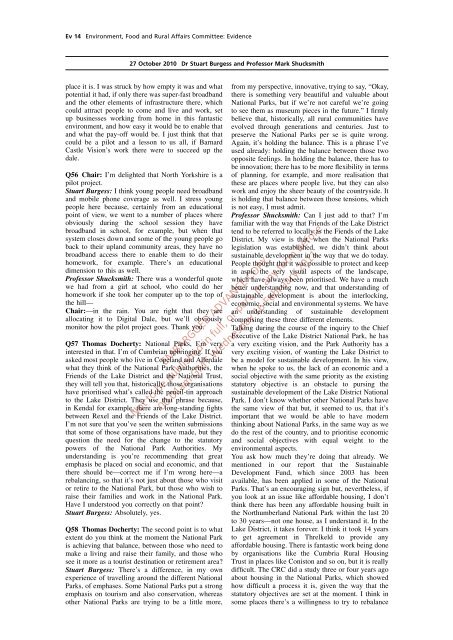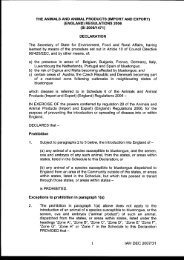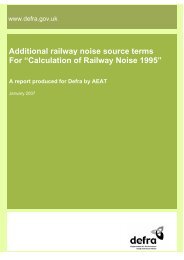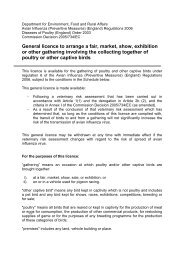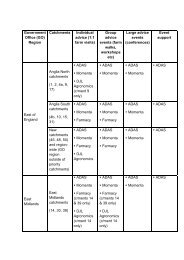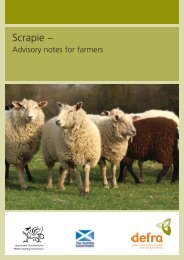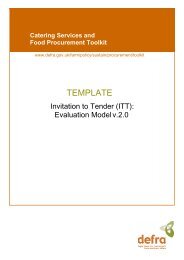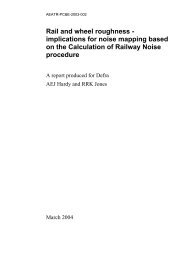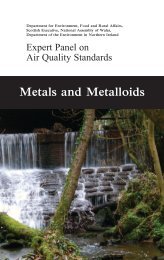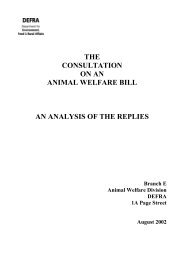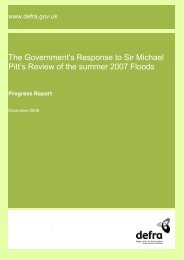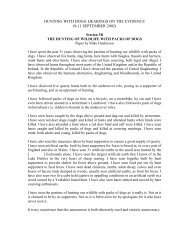Farming in the Uplands - ARCHIVE: Defra
Farming in the Uplands - ARCHIVE: Defra
Farming in the Uplands - ARCHIVE: Defra
You also want an ePaper? Increase the reach of your titles
YUMPU automatically turns print PDFs into web optimized ePapers that Google loves.
Ev 14 Environment, Food and Rural Affairs Committee: Evidence<br />
27 October 2010 Dr Stuart Burgess and Professor Mark Shucksmith<br />
place it is. I was struck by how empty it was and what<br />
potential it had, if only <strong>the</strong>re was super-fast broadband<br />
and <strong>the</strong> o<strong>the</strong>r elements of <strong>in</strong>frastructure <strong>the</strong>re, which<br />
could attract people to come and live and work, set<br />
up bus<strong>in</strong>esses work<strong>in</strong>g from home <strong>in</strong> this fantastic<br />
environment, and how easy it would be to enable that<br />
and what <strong>the</strong> pay-off would be. I just th<strong>in</strong>k that that<br />
could be a pilot and a lesson to us all, if Barnard<br />
Castle Vision’s work <strong>the</strong>re were to succeed up <strong>the</strong><br />
dale.<br />
Q56 Chair: I’m delighted that North Yorkshire is a<br />
pilot project.<br />
Stuart Burgess: I th<strong>in</strong>k young people need broadband<br />
and mobile phone coverage as well. I stress young<br />
people here because, certa<strong>in</strong>ly from an educational<br />
po<strong>in</strong>t of view, we went to a number of places where<br />
obviously dur<strong>in</strong>g <strong>the</strong> school session <strong>the</strong>y have<br />
broadband <strong>in</strong> school, for example, but when that<br />
system closes down and some of <strong>the</strong> young people go<br />
back to <strong>the</strong>ir upland community areas, <strong>the</strong>y have no<br />
broadband access <strong>the</strong>re to enable <strong>the</strong>m to do <strong>the</strong>ir<br />
homework, for example. There’s an educational<br />
dimension to this as well.<br />
Professor Shucksmith: There was a wonderful quote<br />
we had from a girl at school, who could do her<br />
homework if she took her computer up to <strong>the</strong> top of<br />
<strong>the</strong> hill—<br />
Chair:—<strong>in</strong> <strong>the</strong> ra<strong>in</strong>. You are right that <strong>the</strong>y are<br />
allocat<strong>in</strong>g it to Digital Dale, but we’ll obviously<br />
monitor how <strong>the</strong> pilot project goes. Thank you.<br />
Q57 Thomas Docherty: National Parks, I’m very<br />
<strong>in</strong>terested <strong>in</strong> that. I’m of Cumbrian upbr<strong>in</strong>g<strong>in</strong>g. If you<br />
asked most people who live <strong>in</strong> Copeland and Allerdale<br />
what <strong>the</strong>y th<strong>in</strong>k of <strong>the</strong> National Park Authorities, <strong>the</strong><br />
Friends of <strong>the</strong> Lake District and <strong>the</strong> National Trust,<br />
<strong>the</strong>y will tell you that, historically, those organisations<br />
have prioritised what’s called <strong>the</strong> pencil-t<strong>in</strong> approach<br />
to <strong>the</strong> Lake District. They use that phrase because,<br />
<strong>in</strong> Kendal for example, <strong>the</strong>re are long-stand<strong>in</strong>g fights<br />
between Rexel and <strong>the</strong> Friends of <strong>the</strong> Lake District.<br />
I’m not sure that you’ve seen <strong>the</strong> written submissions<br />
that some of those organisations have made, but <strong>the</strong>y<br />
question <strong>the</strong> need for <strong>the</strong> change to <strong>the</strong> statutory<br />
powers of <strong>the</strong> National Park Authorities. My<br />
understand<strong>in</strong>g is you’re recommend<strong>in</strong>g that great<br />
emphasis be placed on social and economic, and that<br />
<strong>the</strong>re should be—correct me if I’m wrong here—a<br />
rebalanc<strong>in</strong>g, so that it’s not just about those who visit<br />
or retire to <strong>the</strong> National Park, but those who wish to<br />
raise <strong>the</strong>ir families and work <strong>in</strong> <strong>the</strong> National Park.<br />
Have I understood you correctly on that po<strong>in</strong>t?<br />
Stuart Burgess: Absolutely, yes.<br />
Q58 Thomas Docherty: The second po<strong>in</strong>t is to what<br />
extent do you th<strong>in</strong>k at <strong>the</strong> moment <strong>the</strong> National Park<br />
is achiev<strong>in</strong>g that balance, between those who need to<br />
make a liv<strong>in</strong>g and raise <strong>the</strong>ir family, and those who<br />
see it more as a tourist dest<strong>in</strong>ation or retirement area?<br />
Stuart Burgess: There’s a difference, <strong>in</strong> my own<br />
experience of travell<strong>in</strong>g around <strong>the</strong> different National<br />
Parks, of emphases. Some National Parks put a strong<br />
emphasis on tourism and also conservation, whereas<br />
o<strong>the</strong>r National Parks are try<strong>in</strong>g to be a little more,<br />
from my perspective, <strong>in</strong>novative, try<strong>in</strong>g to say, “Okay,<br />
<strong>the</strong>re is someth<strong>in</strong>g very beautiful and valuable about<br />
National Parks, but if we’re not careful we’re go<strong>in</strong>g<br />
to see <strong>the</strong>m as museum pieces <strong>in</strong> <strong>the</strong> future.” I firmly<br />
believe that, historically, all rural communities have<br />
evolved through generations and centuries. Just to<br />
preserve <strong>the</strong> National Parks per se is quite wrong.<br />
Aga<strong>in</strong>, it’s hold<strong>in</strong>g <strong>the</strong> balance. This is a phrase I’ve<br />
used already: hold<strong>in</strong>g <strong>the</strong> balance between those two<br />
opposite feel<strong>in</strong>gs. In hold<strong>in</strong>g <strong>the</strong> balance, <strong>the</strong>re has to<br />
be <strong>in</strong>novation; <strong>the</strong>re has to be more flexibility <strong>in</strong> terms<br />
of plann<strong>in</strong>g, for example, and more realisation that<br />
<strong>the</strong>se are places where people live, but <strong>the</strong>y can also<br />
work and enjoy <strong>the</strong> sheer beauty of <strong>the</strong> countryside. It<br />
is hold<strong>in</strong>g that balance between those tensions, which<br />
is not easy, I must admit.<br />
Professor Shucksmith: Can I just add to that? I’m<br />
familiar with <strong>the</strong> way that Friends of <strong>the</strong> Lake District<br />
tend to be referred to locally as <strong>the</strong> Fiends of <strong>the</strong> Lake<br />
District. My view is that, when <strong>the</strong> National Parks<br />
legislation was established, we didn’t th<strong>in</strong>k about<br />
susta<strong>in</strong>able development <strong>in</strong> <strong>the</strong> way that we do today.<br />
People thought that it was possible to protect and keep<br />
<strong>in</strong> aspic <strong>the</strong> very visual aspects of <strong>the</strong> landscape,<br />
which have always been prioritised. We have a much<br />
better understand<strong>in</strong>g now, and that understand<strong>in</strong>g of<br />
susta<strong>in</strong>able development is about <strong>the</strong> <strong>in</strong>terlock<strong>in</strong>g,<br />
economic, social and environmental systems. We have<br />
an understand<strong>in</strong>g of susta<strong>in</strong>able development<br />
compris<strong>in</strong>g <strong>the</strong>se three different elements.<br />
Talk<strong>in</strong>g dur<strong>in</strong>g <strong>the</strong> course of <strong>the</strong> <strong>in</strong>quiry to <strong>the</strong> Chief<br />
Executive of <strong>the</strong> Lake District National Park, he has<br />
a very excit<strong>in</strong>g vision, and <strong>the</strong> Park Authority has a<br />
very excit<strong>in</strong>g vision, of want<strong>in</strong>g <strong>the</strong> Lake District to<br />
be a model for susta<strong>in</strong>able development. In his view,<br />
when he spoke to us, <strong>the</strong> lack of an economic and a<br />
social objective with <strong>the</strong> same priority as <strong>the</strong> exist<strong>in</strong>g<br />
statutory objective is an obstacle to purs<strong>in</strong>g <strong>the</strong><br />
susta<strong>in</strong>able development of <strong>the</strong> Lake District National<br />
Park. I don’t know whe<strong>the</strong>r o<strong>the</strong>r National Parks have<br />
<strong>the</strong> same view of that but, it seemed to us, that it’s<br />
important that we would be able to have modern<br />
th<strong>in</strong>k<strong>in</strong>g about National Parks, <strong>in</strong> <strong>the</strong> same way as we<br />
do <strong>the</strong> rest of <strong>the</strong> country, and to prioritise economic<br />
and social objectives with equal weight to <strong>the</strong><br />
environmental aspects.<br />
You ask how much <strong>the</strong>y’re do<strong>in</strong>g that already. We<br />
mentioned <strong>in</strong> our report that <strong>the</strong> Susta<strong>in</strong>able<br />
Development Fund, which s<strong>in</strong>ce 2003 has been<br />
available, has been applied <strong>in</strong> some of <strong>the</strong> National<br />
Parks. That’s an encourag<strong>in</strong>g sign but, never<strong>the</strong>less, if<br />
you look at an issue like affordable hous<strong>in</strong>g, I don’t<br />
th<strong>in</strong>k <strong>the</strong>re has been any affordable hous<strong>in</strong>g built <strong>in</strong><br />
<strong>the</strong> Northumberland National Park with<strong>in</strong> <strong>the</strong> last 20<br />
to 30 years—not one house, as I understand it. In <strong>the</strong><br />
Lake District, it takes forever. I th<strong>in</strong>k it took 14 years<br />
to get agreement <strong>in</strong> Threlkeld to provide any<br />
affordable hous<strong>in</strong>g. There is fantastic work be<strong>in</strong>g done<br />
by organisations like <strong>the</strong> Cumbria Rural Hous<strong>in</strong>g<br />
Trust <strong>in</strong> places like Coniston and so on, but it is really<br />
difficult. The CRC did a study three or four years ago<br />
about hous<strong>in</strong>g <strong>in</strong> <strong>the</strong> National Parks, which showed<br />
how difficult a process it is, given <strong>the</strong> way that <strong>the</strong><br />
statutory objectives are set at <strong>the</strong> moment. I th<strong>in</strong>k <strong>in</strong><br />
some places <strong>the</strong>re’s a will<strong>in</strong>gness to try to rebalance<br />
EMBARGOED ADVANCE COPY:<br />
Not to be published <strong>in</strong> full, or part, <strong>in</strong> any form before<br />
00.01am GMT Wednesday 16 February 2011


